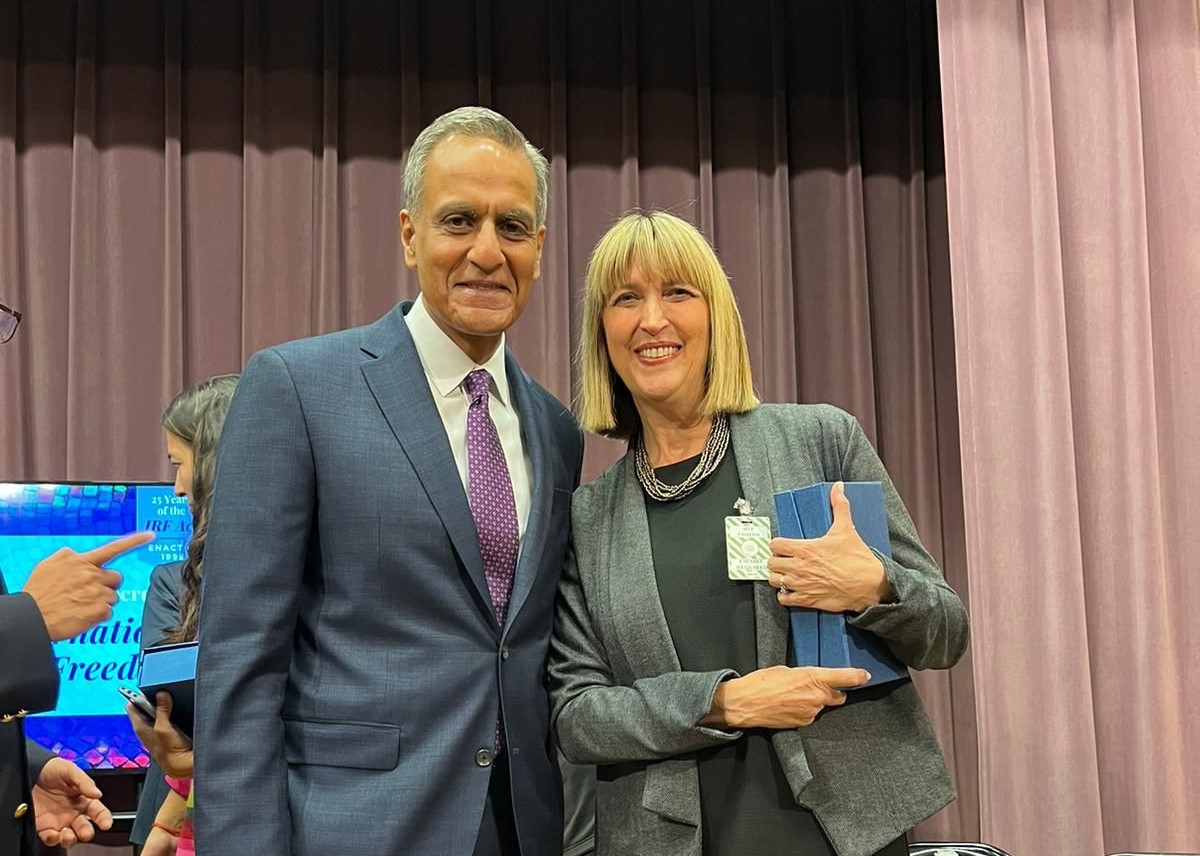
Holocaust

Holocaust Centre director awarded for promoting religious freedom
Tali Nates, the founder and director of the Johannesburg Holocaust & Genocide Centre (JHGC), received the United States State Department’s International Religious Freedom Award in Washington, D.C., on 18 January, “in recognition of [her] courage and commitment to promoting and defending religious freedom globally”.
She was one of eight recipients, including from Lithuania, Nicaragua, and Nigeria. This round of awards commemorated the 25th anniversary of the United States International Religious Freedom Act, signed by President Bill Clinton in 1998. US Secretary of State Antony Blinken was unfortunately “otherwise occupied”, and the award was presented by his deputy, Richard Verma.
Nates, who is currently lecturing in Flagstaff, Arizona, said the award was recognition of many years of work as a historian in the field of Holocaust and genocide. “I work with amazing people and networks in South Africa and around the world, from Auschwitz to Kigali in Rwanda. This award wasn’t expected, because I just do the work and don’t know other people are watching. It’s good to see that others believe that the work has value and merit. I’m overwhelmed and grateful.”
The award citation noted that “Nates uses case studies from the Holocaust, the genocide against the Tutsi in Rwanda, and apartheid in South Africa to teach youth to stand up to antisemitism, racism, xenophobia, homophobia, and all forms of othering. Nates also works to promote reconciliation and healing in post-conflict societies torn by religious and ethnic conflict, and is contributing to a growing body of scholarly work on the African historical experience of trauma.” She draws on her own experience – her father was saved in the Shoah by Oskar Schindler.
“The award recognised the layering of the work that the JHGC does. It’s not just about death, but about the individuals and the lives they led. They had hopes and dreams, and could have done so much for the world. Our work on xenophobia urges us to see refugees as people, not in terms of ‘us’ and ‘them’,” Nates said.
“I believe strongly in partnering – it gives hope in our very challenging world. The world is in a difficult place. We have so many ongoing conflicts in Africa – in the Democratic Republic of the Congo, Ethiopia, Sudan – and we have experienced nearly two full years of war and killing in Ukraine.
“I asked myself why the award was given now,” Nates said. “The decision was made in November 2023, when Israel was already well into its latest war with Hamas. The award recognises the work we’re doing in 13 African countries. We promote human rights, dialogue, and opening spaces.”
She noted that the JHGC has been sought after in this time. “People need a safe space. We’re a historical space, not a political space. A place where people can learn and ask questions. We’ve seen a narrowing of spaces for dialogue in a wounded world. I know people are hurt, angry, and sad, but as human beings, we can rise above this. We must fight ‘othering’, xenophobia, racism more than ever now.”
Nates paid tribute to the late Gerald Leissner for his vision and support for the JHGC. She also thanked Johannesburg’s Holocaust survivors, particularly Veronica Phillips, who passed away in 2021.
Five years after its opening, Nates believes that the JHGC “is something South Africa and Africa can be proud of”. One positive legacy of the COVID-19 pandemic has been how the centre has used technology to connect to dynamic, powerful speakers and like-minded institutions all over the world. “We realised that there was no need to spend hundreds of thousands of rands all the time to have access to the best scholars internationally. Of course, we’ll still bring people out for special events.”
Nates is no stranger to awards for her work. In 2010, she was chosen as one of the top 100 newsworthy and noteworthy women in South Africa by the Mail & Guardian. She has won many awards including the Jewish Achievers Kia Community Service Award (South Africa, 2015); the Gratias Agit Award (Czech Republic, 2020); the Austrian Holocaust Memorial Award (Austria, 2021); and the Goethe Medal (Germany, 2022).
“This award comes at this difficult time of trauma and sadness, great concern, and worry for the Jewish community in South Africa and around the world. Jewish people are facing the aftermath of the massacre of 7 October, a pogrom, and rising antisemitism. We’re feeling under attack. But the award shows that we’re seen, and the Jewish community’s efforts, its museums, memorials, and education are works against hatred. We may think everything is bad in these times and cannot see the light at the end of the tunnel. But we must continue to do the work. We’re down, but not out.”











yitzchak
March 24, 2024 at 8:48 am
Gukurahundi by Mugabe in matabililand should be documented by our genocide museum from living witnesses.
Also the genocide by Hamas on 7.10